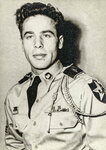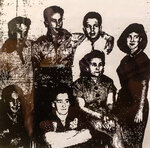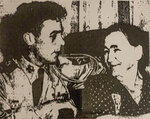More than 70 years ago former publisher of the Ledger, Robert M. White II, got to break some news that would raise the spirits of the entire town.
White II, former publisher of the Mexico Ledger …
This item is available in full to subscribers.
We have recently launched a new and improved website. To continue reading, you will need to either log into your subscriber account, or purchase a new subscription.
If you are a digital subscriber with an active subscription, or you are a print subscriber who had access to our previous website, then you already have an account here. Just reset your password if you have not yet logged in to your account on this new site.
If you are a current print subscriber and did not have a user account on our previous website, you can set up a free website account by clicking here.
Otherwise, click here to view your options for subscribing.
Please log in to continue |



More than 70 years ago former publisher of the Ledger, Robert M. White II, got to break some news that would raise the spirits of the entire town.
White II, former publisher of the Mexico Ledger from 1945 to 1986, loved to break the news on the front page of the paper but in September of 1953, he couldn’t wait for the presses to fire up for the next edition.
White was sitting at his desk around 9:30 p.m. when the phone rang. When he picked up the phone a reporter from the Associated Press office in Kansas City was on the other end of the line with the news that Master Sergeant Moses (Moss) E. Shoemaker, a prisoner of war in North Korea, had been released by the Chinese. The reporter wanted to know if White could get a quote from Shoemaker’s grandmother, Martha Shoemaker, who lived near town.
White was so impatient that just a few minutes after leaving a message for someone in the Shoemaker family to call him back he hopped in his car and started driving to where he knew Martha Shoemaker had lived but couldn’t locate any of the neighbors. White found out Mrs. Shoemaker was staying with her son, Ed Shoemaker, in Vandalia. White was able to locate both of the Shoemakers.
“Thank the Lord, I sure am glad,” Martha said over and over to White.
Shoemaker was just 20 years old when he and 38 other men in his platoon were captured on Dec. 1, 1950. It would be several months before anyone knew that Shoemaker was alive. Shoemaker was a member of the Corps of Engineers and was in the process of destroying U.S. equipment as the Chinese advanced. Of the 39 men captured only eight returned home alive including Shoemaker.
Shoemaker was in captivity for close to 32 months when he was finally released on Sept. 9, 1953. The American soldier and others were transported to San Francisco and then later to Mountain Home Air Base in Idaho to stay in the hospital until he could get better and be close to his mother, Mary Frances Malone Jesse, who had moved to Idaho after she remarried. Shoemaker’s father had died when he was five years old in an accident.
It would be more than a month before Shoemaker would make his way back home to Mexico. A committee that was headed by C.L. Creed of the VFW, John Burchfield of the American Legion, and Lester Stowers of the Junior Chamber of Commerce, planned a huge celebration for Shoemaker’s return home. The celebration was to include a parade through the Downtown Square and a presentation of gifts to Shoemaker that had been collected from the community.
The celebration would not happen.
The day before the celebration was to take place Shoemaker informed the committee he wanted to call it off. “I just don’t think I can go through with it,” Shoemaker told the Ledger. “All the time I was away I thought about Mexico. I’m on leave from the hospital right now and have to go back soon. I’ll always hold the people of Mexico dear to my heart.”
The committee called off the celebration and understood his disposition.
“We want Moss’ return to be the way he wants it,” a committee person who was quoted by the Ledger said. “We understand how he feels, know about his hospitalization and while we regret the ceremony can’t be held we’re anxious for Moss to relax and enjoy every minute of his homecoming.”
Shoemaker described to the Ledger what it was like in captivity for 32 months and how he survived.
“I’ll tell you one thing those Communists, the only thing the Chinese did in this was make a hell of a lot of good Americans out of the guys that got back,” Shoemaker said. “We never knew what freedom meant. Not many people do. But we do now.”
Shoemaker said he and others were subjected to constant propaganda.
“When they first started working on us, trying to make us Communist, they told us bluntly; ‘Those who learn the truth will go home no matter who wins the war but those who don’t accept Communism will never go home,’” Shoemaker said. “And they put up a pretty convincing story if you were sucker enough to fall for it.”
Shoemaker said the POWs had to rely on each other for survival.
“One day you would see a fellow carry his buddy over to the place where they piled the bodies and the next day that fellow would be carried over,” Shoemaker said. “If a fellow wasn’t with somebody he knew, nobody knew him, he just died. He died and was left there. The wounded died fast, of course. We used T-shirts for bandages, but they died. There were some American doctors and surgeons who were captured but they couldn’t do anything. Nothing to work with.”
Shoemaker said they were given little to eat and mostly survived on corn and they were not allowed to practice Christianity.
“There is no God as far as they’re concerned,” Shoemaker said. “If they ever come over here to the United States, they’re going to tear down the churches. You won’t be allowed to think. It’s a dictatorship.”
Shoemaker shied away from any kind of attention and during his interview, he requested White not focus on him but rather wanted him to talk about those who didn’t make it back and the perceived threat of Communism at the time.
Shoemaker’s actions were much like another POW from Mexico who had also been captured in Korea but spent much less time in captivity. Rube F. Senor Jr. was captured in 1951 but spent only 50 days in captivity. Senor, like Shoemaker, didn’t want to say much out of fear because guys like Shoemaker were still being held and he didn’t want retribution because of his remarks.
“Make it about the boys I’m telling you about, not me,” Shoemaker said. “I didn’t do anything but I have a story and I hope people will read about those boys and Communism.”